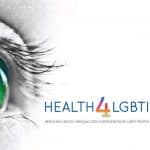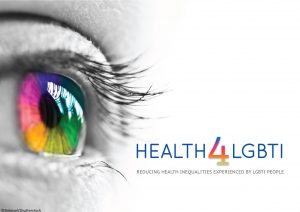On the 1st and 2nd of February 2018, during the Health4LGBTI conference in Brussels, the European Commission will launch a new and innovative training course for Health Professionals on how to reduce health Inequalities for lesbian, gay, bisexual, trans and intersex (LGBTI) people. It will be the culmination of a 2-year pilot project carried out by a consortium of 5 EU partners appointed by the European Commission and funded by the European Parliament. The results so far include research into the experiences of health professionals and LGBTI people, and recommendations for progress.
 The Health4LGBTI Project Aims
The Health4LGBTI Project Aims
In September of 2015, the European Commission set out plans for a far-reaching and ambitious project. The aim was to investigate the health inequalities experienced by LGBTI people (especially those in vulnerable situations), identify barriers faced by health professionals when providing care to LGBTI patients, and based on the outcomes of the research, to design, test and validate a training course for health professionals on how to reduce health inequalities.
A multidisciplinary team with expertise in public health, human rights, LGBTI health, health inequalities and training were selected to undertake the project. Under the coordination of Verona University Hospital (IT), the European partners – EuroHealthNet (BE/EU), ILGA Europe (BE/EU), the University of Brighton (UK), and the National Institute of Public Health-National Institute of Hygiene Poland (PL) have been working with on Health4LGBTI since March 2016.
The Research Phase – Main findings
The first 12 months of the project were dedicated to research led by the University of Brighton in collaboration with ILGA Europe.

We took a snapshot of the current situation, including a scientific review of peer reviewed journals and a comprehensive scoping of grey literature from 27 Member States and relevant European/international sources (See Fig. 1)
This was followed by qualitative research consisting of 12 focus group studies (six groups with Health Professionals and six groups with LGBTI people) conducted in six Member States (Belgium, Bulgaria, Italy, Lithuania, Poland and the UK).
Findings revealed the existence of health inequalities, barriers, and discrimination based on sexual orientation, gender identity, and sex characteristics of LGBTI people. Many of the barriers LGBTI people experience are linked to stigma, discrimination and patient confidentiality issues. Barriers for health professionals were found to be linked to a lack of knowledge or cultural competence concerning the lives and healthcare needs of LGBTI people. LGBTI people and healthcare professionals involved in the project agreed that mandatory training around LGBTI issues is needed by all staff in healthcare services.
The findings also highlighted gaps in research, namely on the health profile and specific needs in particular of trans and intersex people, and on the issue of how multiple marginalisation (LGBTI people who are older, younger, disabled, migrants, living in rural areas, or living in poverty) can impact on health outcomes.
Both reports can be downloaded from the Health4LGBTI Website.
Developing and Piloting the Training Course – Challenges and Solutions

Building on the research findings, a training package was developed by Verona University Hospital, ILGA-Europe and the National Institute of Public Health – National Institute of Hygiene
The main challenge was to develop a training package appropriate for a range of Health Care Professionals (medical doctors – GPs and Specialists – nurses, psychologists, social workers, administrative staff) across all disciplines of healthcare that could potentially be implemented at any stage of education and working life, from undergraduate level to continuing professional education and in different EU Member States.
The solution was an innovative and interactive modular training course comprising 4 stand-alone modules with a complete duration of between 8-10 hours (see Fig.2). The segmentation of the modules linked to specific learning objectives (skills, knowledge, attitudes) means that the course can be adapted to different target audiences (from medical specialists to GP front office administrative staff) and to different cultural contexts. The course has been piloted successfully in six Member States (Belgium, Bulgaria, Italy, Lithuania, Poland and the UK) and will be available on-line on the DG SANTE website in 2018.
Next Steps – Recommendations for Change
Despite the progress that has been made in Europe in tackling social exclusion and discrimination experienced by LGBTI people, the most likely root causes of health inequalities that have been identified in the research are i) cultural and social norms that give preference to and prioritise heterosexuality; ii) minority stress associated with sexual orientation, gender identity, and sex characteristics; iii) victimisation; iv) discrimination (individual and institutional), and; v) stigma.
For this reason, it is essential that health systems and health professionals ensure that health service provision is accessible to LGBTI patients. The provision of mandatory training is an important part of this process whereby the culture of heteronormativity can be dismantled and replaced by a more inclusive environment, which recognises the needs of LGBTI people and facilitates access to appropriate care.
More information about Health4LGBTI and all reports can be found online. To register your interest in participating contact Anne Pierson ([email protected])
About the Author
This article was prepared by the Health4LGBTI network – Francesco Amaddeo, Sophie Aujean, Kath Browne, Clizia Buniotto, Ruth Davis, Valeria Donisi, Francesco Farinella, Lorenzo Gios, Nick McGlynn, Massimo Mirandola, Anne Pierson, Nuno Pinto, Alex Pollard, Magdalena Rosinska, Juliette Sanchez-Lambert, Nigel Sherriff, Marta Niedźwiedzka-Stadnik, Karolina Zakrzewska, Laetitia Zeeman.

The Health4LGBTI network
This article was prepared by the Health4LGBTI network – Francesco Amaddeo, Sophie Aujean, Kath Browne, Clizia Buniotto, Ruth Davis, Valeria Donisi, Francesco Farinella, Lorenzo Gios, Nick McGlynn, Massimo Mirandola, Anne Pierson, Nuno Pinto, Alex Pollard, Magdalena Rosinska, Juliette Sanchez-Lambert, Nigel Sherriff, Marta Niedźwiedzka-Stadnik, Karolina Zakrzewska, Laetitia Zeeman.
